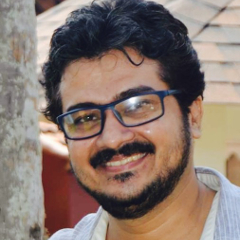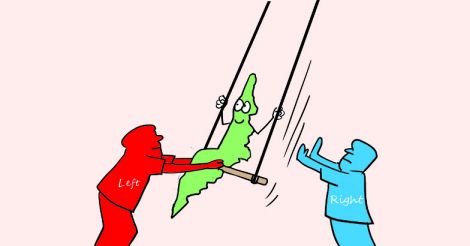Kerala just celebrated its 61st birthday on November 1. The six decades have been an amazing journey. When the first communist government in 1957 was dismissed by the Union government, U.S. spy agency CIA was alleged to have played a role in it. Sixty years down the line, the 'Washington Post' has heaped praise on the communist movement in the south Indian state.
Kerala politics has come of age. If the first election was a contest among four political parties - The undivided Communist Party of India, the Congress, the Praja Socialist Party and the Revolutionary Socialist Party - as many as 44 parties were in the fray in last year’s assembly election. The number of constituencies has increased from 114 to 140. The number of candidates has increased from 406 to 1,206. The number of women candidates rose from nine to 102. The number of voters has increased from 75 lakh to 2.60 crore.
Laboratory of coalition politics
The mushrooming of political parties led to unique political experiments. Kerala became a laboratory of coalition politics much before the trend caught on at the national level.
First chief minister E.M.S. Namboodiripad deserves credit as the architect of the coalition politics. The Congress hesitated at first but embraced allies later under K. Karunakaran. By 1982, Kerala's two political fronts had taken shape, ending an era of uncertainty that had pushed the state to president's rule eight times before that.
The strong coalition system has acted as a bulwark against trends of centralization. No party in Kerala has stayed immune from splits, except the BJP, which has been present in the state since its formation in the early 1980s.
Eight of the Kerala Congress factions were in the fray in the recent assembly election. The PSP has fragmented into many Socialist factions before a namesake faction ended up as a BJP ally!
Money, money
Namboodiripad proudly inducted into his cabinet extraordinary talents such as V.R. Krishna Iyer and Joseph Mundassery. The current CPM-led government includes millionaires such as Thomas Chandy. The transport minister is worth a whopping Rs 92 crore, as per an affidavit he submitted before the Election Commission.
As many as 200 candidates with assets worth more than Rs 1 crore filed nominations in the recent election. Of them, 61 made it to the assembly.
The current composition of the house reflects a change in mindset. Millionaires and industrialists are no longer untouchables in politics. Each MLA has spent Rs 19 lakh on average to win the election, according to an official estimate. The sum is greater in reality.
Parties and leaders choose hi-tech means to communicate with the people. Everyone from the chief minister relies on social media to drive their campaigns.
Absent local satraps
Kerala's political fortunes are dependent on the CPM and the Congress, though the dominant parties have felt a dent in their support base. The undivided CPI scored 35.28 per cent votes in 1957. In 2016, the combined share of the CPM and the CPI hardly matched that of their predecessor. The CPM's share was 26.66 per cent.
The Congress's share dipped from 37.85 per cent to 23.82 per cent in the same period.
Still Kerala did not contribute a leader in the league of K. Kamaraj, J. Jayalalithaa or N. Chandrababu Naidu who could steer the course of the national politics.
The unique political situation was a result of Kerala's refusal to act parochially, said Dr G. Gopakumar, political commentator and the vice chancellor of the Central University of Kerala in Kasaragod.
CMP general secretary C.P. John sought to highlight another disturbing trend. The socialists were losing their vote share of about 14 percent to the BJP.
Communal tinge
The Muslim League has been a crucial force in Kerala politics right from the late 1950s. The party, however, projected itself as a secular party. The BJP, on the other end of the spectrum, is accused of toeing a soft Hindutva line.
However, the emergence of the PDP, SDPI and the Welfare Party has posed a major challenge to the established political fronts. The SDPI finished third in the just-concluded assembly by-election in Vengara.
Mainstream political parties in Kerala are moving to unchartered territory as the BJP strives hard to make a foothold in the state.

























